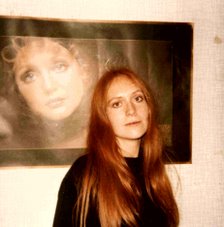I wrote my first song when I was six. Over the years, tunes have come to me in all sorts of inconvenient places - top decks of buses, standing in a queue, on a train - always when I have been far from a manuscript book of tape recorder. (Not that I would want to start humming into a recording device in front of people, not even my mobile phone.) One day, in desperation, having only the back of a bus ticket to write on, I came up with means of jotting down a snatch of melody so that I know not only the note, but the value of the note, when I come to work on it later.
What I do is this. Draw a line across a scrap of paper. (Yes, I realise one needs a pen for this and I have often had to dart into a newsagent's and pay over the odds for one Bic when I could get a whole bundle of them for the same money at Staples or Macro. But what the hell, this is an emergency when even the stub of an eyebrow pencil or lipstick will do.) This line now represents Middle C. (Perhaps you want to set your tune in the key of D or G, but you can transpose it later. Desperate circumstances call for flexibility.)
You now have your Middle C line. The letter A below it represents the A below middle C, and an A above the line is the first A above middle C. AO means octave A. Add a sharp or a flat sign if required.
That's the notes all settled. Now, how about their values? A on its own is a crotchet. A in a circle is a minim. A in two circles is a semibreve. A with an inverted V over it is a quaver, two inverted V's means a semiquaver. A with a dot after it is a dotted crotchet - and so on. Easy-peasy. It works for me! I have just bought a manuscript book and am busy scribbling all the snippets I've collected on scraps of paper, Post-it notes and so on. Soon, I shall exhume the contents of coat pockets and handbags to see what potential hits might be lurking there.
I supposed I should copyright my system so here is a nice (c) August 2008. Not that I expect many people will need it. Budding songwriters these days will be busy warbling into their MP4's and mobiles, or their digital recorder. I tell you what, though - using the old-fashioned manuscript book is an awful lot easier than trying to set out one's ideas in composing software like Noteworthy or Sibelius. They are fine for when you want to notate and print out the final version, but are no good for musical jottings on the run.
Yes! After all this time - I'm Back!
8 months ago

No comments:
Post a Comment